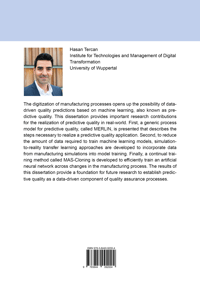
Shop : Weiterempfehlung
Shop
Weiterempfehlung
48,80 €ISBN 978-3-8440-9200-4Paperback180 Seiten59 Abbildungen266 g24 x 17 cmEnglischDissertation
August 2023
Hasan Tercan
Machine Learning-based Predictive Quality in Manufacturing Processes
The digitization of manufacturing processes opens up the possibility of data-driven quality predictions based on machine learning (ML) methods, also known as predictive quality. The predictions serve as a decision-making basis for process experts to initiate quality-improving measures in the process at an early stage. Although predictive quality is essentially based on known methods of data processing and ML, there is a need for further research to establish it. On the one hand, there is a lack of implementation-oriented and transferable approaches for the successful realization of predictive quality. On the other hand, key challenges have to be overcome, especially since the collection of representative data in manufacturing processes is costly and the processes are characterized by constant changes. This dissertation addresses these research gaps. First, a generic predictive quality process model called MERLIN is presented, which describes the necessary steps to realize a predictive quality application. Then, two simulation-to-reality transfer learning approaches are presented, which consist of using low-cost data from manufacturing simulations for training predictive quality models. Finally, a novel continual learning method called MAS-Cloning is presented to train an artificial neural network over changes in the manufacturing process. The goal of this method is to maintain predictive accuracy during model updates while improving training and data efficiency.
The digitization of manufacturing processes opens up the possibility of data-driven quality predictions based on machine learning (ML), also known as predictive quality. The predictions can be used by process experts to initiate quality improvement actions in the process. Although the core concepts of predictive quality are based on well-known data processing and ML methods, further research is needed to establish
them in manufacturing. On the one hand, there is a lack of transferable approaches for the successful realization of predictive quality. On the other hand, there are significant challenges to overcome, especially since the collection of representative data in manufacturing processes is costly and the processes are characterized by constant change. This thesis addresses these research gaps. First, a generic process model for predictive quality, called MERLIN, is presented that describes the steps necessary to realize a predictive quality application. The process model consists of four iterative phases: formalization (definition of the process and data scope), data preparation (collection and processing of representative manufacturing data), model building (training and validation of an operational learning model), and model usage (monitoring and model updating in case of process changes). In addition, to reduce the amount of data required to train predictive quality models, two approaches are developed to incorporate data from manufacturing simulations into model training. One is a simulation-to-
reality transfer learning approach, where an artificial neural network (ANN) is first pre-trained on simulation data before being finetuned onreal manufacturing data. The second is a learning-based approach to reduce the simulation-to-reality gap of manufacturing simulations. Finally, a continual training method called MAS-Cloning is developed to efficiently train an ANN across changes in the manufacturing process. The goal of this method is to maintain prediction accuracy during model updates while improving training and data efficiency. This
is achieved by combining the regularization method memory-aware synapses (MAS) with a transfer of pre-trained network weights. Overall, the thesis provides important research contributions for the realization of predictive quality in real manufacturing processes. It also provides a foundation for future research to establish predictive quality as a data-driven component of quality assurance processes.
Schlagwörter: machine learning; continual learning; transfer learning; quality predictionmanufacturing; quality assurance
Die Weiterempfehlung wird per E-Mail an die von Ihnen unten angegebene Adresse verschickt.
Die mit einem * gekennzeichneten Felder sind Pflichtfelder! Bitte füllen Sie diese unbedingt vollständig aus.
Shaker Verlag GmbHAm Langen Graben 15a52353 Düren
Mo. - Do. 8:00 Uhr bis 16:00 UhrFr. 8:00 Uhr bis 15:00 Uhr
Kontaktieren Sie uns. Wir helfen Ihnen gerne weiter.



